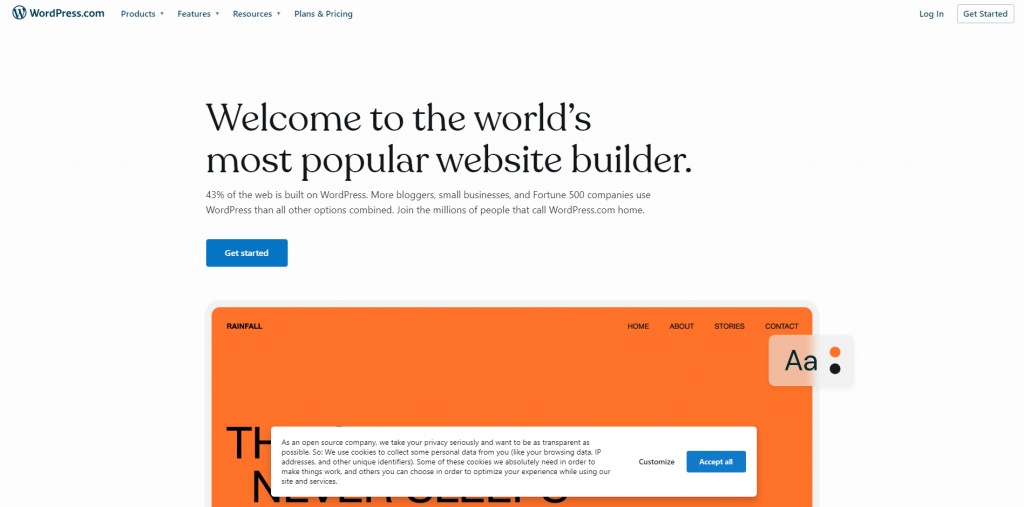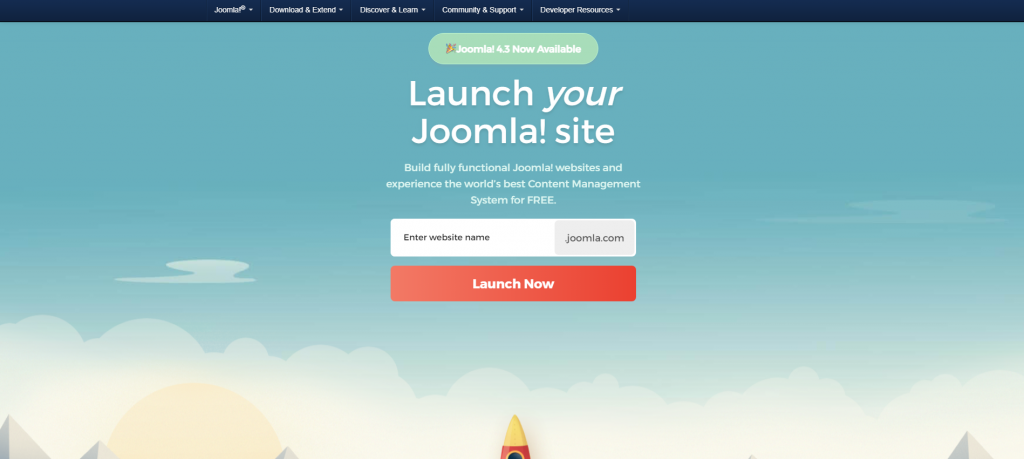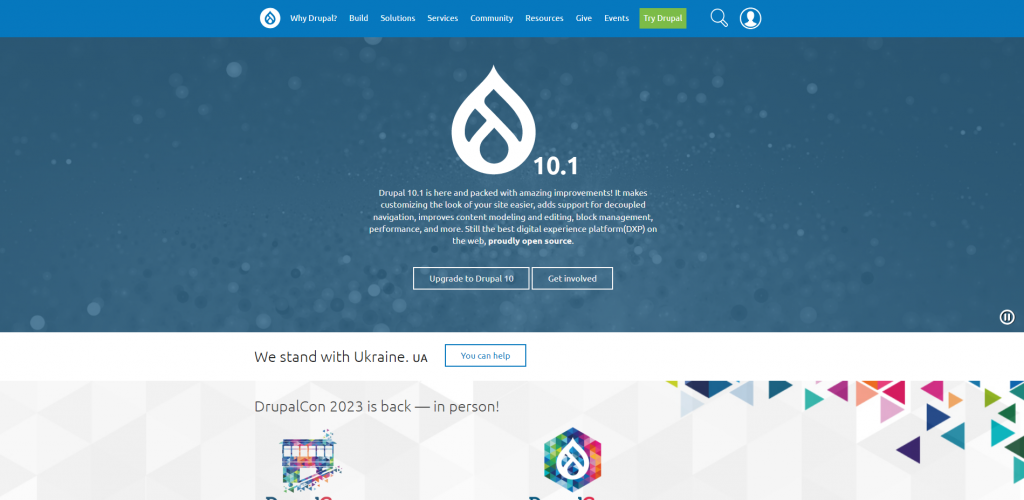In the digital age, an effective content management system (CMS) is crucial for businesses and individuals alike to manage their online presence efficiently. With numerous options available, selecting the right CMS can be a daunting task. To help you make an informed decision, we have compiled a list of the top 5 popular content management systems, along with their pros, cons, and pricing information. So, let’s dive in!
1) WordPress

WordPress is undoubtedly the most widely used CMS, powering more than 40% of websites on the internet. Its popularity stems from its user-friendly interface, extensive theme and plugin ecosystem, and strong community support. With WordPress, even beginners can quickly create and manage websites. Additionally, it offers excellent SEO capabilities, making it a favourite among marketers.
Pros
- Intuitive and beginner-friendly interface.
- Vast collection of themes and plugins for customisation.
- Strong community support and extensive documentation.
- Excellent SEO features and plugins.
- Regular updates and security enhancements.
Cons
- Frequent updates may require careful management to avoid compatibility issues.
- Customisation options can be overwhelming for beginners.
- Vulnerability to security threats if not properly maintained.
Pricing: WordPress itself is free to use, but you will need to consider costs for web hosting, domain registration, premium themes, and plugins.
2) Joomla

Joomla is a powerful CMS known for its flexibility and scalability, making it suitable for both small websites and complex online applications. It strikes a balance between ease of use and advanced functionality, making it popular among developers and experienced users. Joomla offers a wide range of templates and extensions, enabling users to create dynamic websites with ease.
Pros
- Robust user management system with fine-grained access controls.
- Advanced functionality for building complex websites.
- Multilingual capabilities for international websites.
- Large community and extensive documentation for support.
- Built-in caching for improved performance.
Cons
- The learning curve can be steep for beginners.
- Fewer themes and extensions compared to WordPress.
- Limited backward compatibility with older extensions.
- Requires regular updates for security patches.
Pricing: Joomla itself is free to use, but you will need to consider costs for web hosting, domain registration, premium templates, and extensions.
3) Drupal

Drupal is a CMS renowned for its scalability and ability to handle large, high-traffic websites. It excels in delivering advanced user management, content organisation, and customisation options. Drupal is highly extensible, with a vast library of modules to enhance functionality. It is favoured by developers and organisations that require complex websites with enterprise-level features.
Pros
- Powerful content organisation and categorisation capabilities.
- Scalability to handle high-traffic websites.
- Advanced user management and permission settings.
- Extensive module library for enhanced functionality.
- Strong security features.
Cons
- Steeper learning curve compared to other CMS platforms.
- Customisation and theming can be time-consuming.
- Smaller community compared to WordPress and Joomla.
- Updates may require manual intervention for complex setups.
Pricing: Drupal itself is free to use, but you will need to consider costs for web hosting, domain registration, premium themes, and modules.
4) Shopify

Shopify is a cloud-based CMS that focuses solely on e-commerce websites. It offers a user-friendly interface and requires no coding knowledge, making it accessible to beginners. Shopify handles all the technical aspects, including hosting, security, and updates, allowing users to focus on their online business.
Pros
- User-friendly interface with intuitive store management.
- Hassle-free setup and easy to use, even for beginners.
- Reliable and secure hosting with built-in SSL encryption.
- Extensive selection of professional e-commerce templates.
- Seamless integration with popular payment gateways and third-party apps.
Cons
- Limited customisation options compared to self-hosted CMS platforms.
- Transaction fees on certain payment gateways, unless using Shopify Payments.
- Advanced features and functionalities may require additional paid apps.
- Limited control over server infrastructure and performance optimisation.
Pricing: Shopify offers different pricing plans starting from Basic Shopify at a monthly cost, followed by Shopify and Advanced Shopify, each with increasing features and capabilities. The pricing ranges from £22 to £246 per month, depending on the plan and additional features required.
5) Wix

Wix is a popular cloud-based CMS that emphasises simplicity and ease of use. It offers a drag-and-drop website builder that allows users to create visually appealing websites without any coding knowledge. Wix provides a wide range of templates and pre-built elements, making it beginner-friendly and suitable for small businesses, portfolios, and personal websites.
Pros
- Intuitive and user-friendly interface with a visual website editor.
- Extensive collection of professional templates for various industries.
- Built-in hosting and automatic updates.
- App Market for adding additional functionality.
- Suitable for small-scale websites and individuals without technical expertise.
Cons
- Limited flexibility and customizability compared to self-hosted CMS platforms.
- Can be challenging to migrate to another CMS in the future.
- Free version includes Wix branding and limited features.
- Advanced features may require higher-tier plans.
Pricing
Wix offers various pricing plans to cater to different needs, starting from the Connect Domain plan to higher-tier plans like Combo, Unlimited, and VIP. The pricing ranges from £3 to £18 per month, depending on the plan and additional features required.
Conclusion
When selecting a CMS, it’s important to consider your specific requirements, technical expertise, long-term goals, and budget. WordPress, Joomla, Drupal, Magento, Shopify, and Wix are all popular CMS options, each with its own strengths and weaknesses. WordPress remains the most widely used and versatile CMS, while Joomla, Drupal, and Magento cater to more advanced and complex website needs. Shopify specializes in e-commerce, and Wix offers simplicity and ease of use for small-scale websites.
Take the time to explore the features, pros, cons, and pricing of each CMS to determine which one aligns best with your goals and resources. Remember, selecting the right CMS will empower you to effectively manage and grow your online presence.